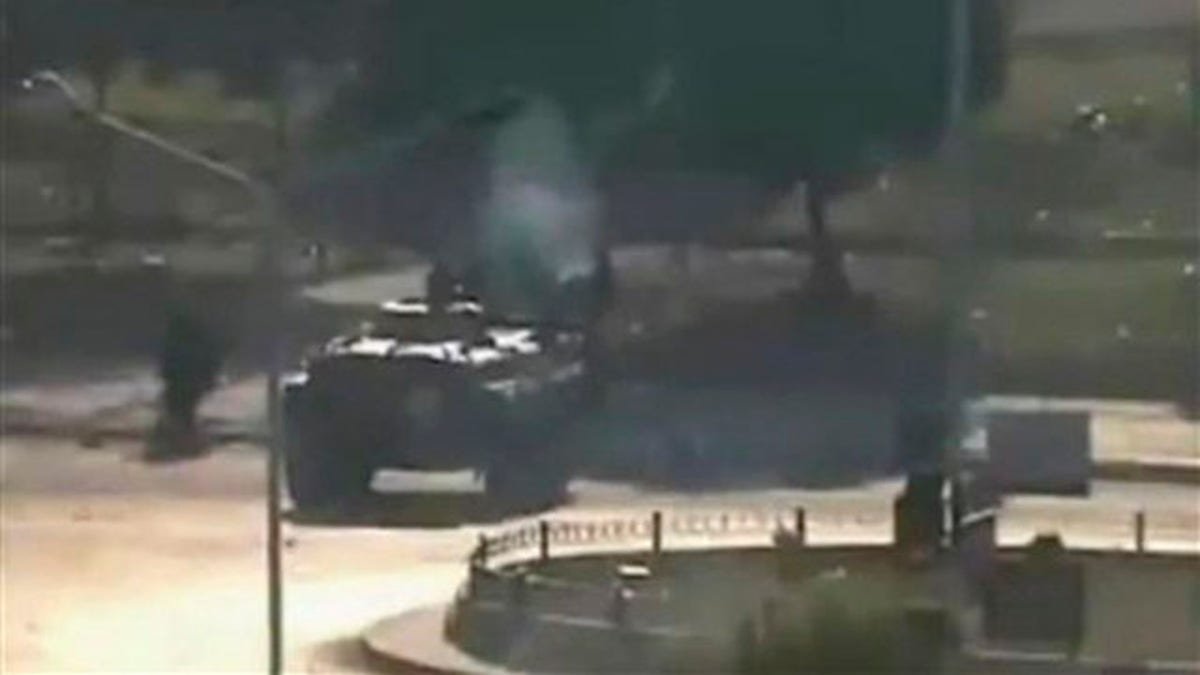
This Aug. 3 file image posted on the Internet by Shaam News Network shows what they purport to be a military tank on the streets of the city of Hama, Syria. (AP)
The United States and its allies are struggling to drive a wedge into the Syrian regime, with President Bashar al-Assad's military continuing to support and carry out a deadly campaign against protesters.
The campaign has escalated since Sunday, when dozens were killed in clashes with Syrian troops. The regime has dispatched tanks to the restive city, shelling buildings and shooting at residents.
Though U.S. officials claim it's only a matter of time before Assad is gone, the assault is a demonstration of his hold on power. Unlike in Egypt, where Hosni Mubarak's military refused to fire on protesters, and unlike in Libya, where top-level defections early on left Muammar al-Qaddafi isolated, Assad's military has remained mostly intact.
Finding a way to split Syria's military and business elite away from Assad remains a key challenge as the Obama administration tries to make a difference in Damascus short of launching a Libya-style international raid on the nation.
"You are seeing some degree of fragmentation in the military," said David Schenker, a former Defense Department aide who worked on Syria in the George W. Bush administration. But he said unique circumstances make the military less ripe for defections in Syria than in other countries.
He said tribal divisions and longstanding resentment toward Qaddafi made his regime tenuous in the lead-up to the rebellion against Tripoli. He said the conscripted soldiers in Egypt were "from the people," and disinclined to fight them on behalf of Mubarak.
Though Syria's soldiers are also conscripted, the commanders largely are from the elite and minority Alawite sect, to which Assad also belongs.
Schenker, the director of the Program on Arab Politics at The Washington Institute for Near East Policy, said that after decades in power, those Alawite commanders fear "severe retribution" should the regime tumble. So they are willing to fight for its survival.
But he said the United States and its allies should start putting psychological pressure on the military elite, telling them in public that the violence could implicate then in future war-crimes investigations but that it's also not too late to peel off.
The Obama administration tried to step up the pressure on Assad and his inner circle Thursday with a new round of sanctions.
The sanctions against Assad family confidante Muhammad Hamsho and his firm, Hamsho International Group, freeze any assets they may have in U.S. jurisdictions and bar Americans from doing business with them. Hamsho's holding company has about 20 subsidiaries ranging from construction, civil engineering, telecommunications and hotels to carpets sales, horse trading and ice cream production.
The new penalties announced by the Treasury Department did not, however, target Syria's energy sector, something administration officials had repeatedly over the past several weeks suggested was coming. Officials said those sanctions, which are expected to hit state-owned and -affiliated oil and gas companies that are a leading revenue source for the government, are still in the works and could be unveiled in the coming days.
Schenker said those sanctions, if enacted, could help peel off the business elite by making it too costly to support Assad.
Sixty-eight senators on Wednesday sent a letter urging President Obama to impose energy sector sanctions along with the Europeans, as well as new travel and banking sanctions.
"It is clear that President al-Assad is not committed to pursuing the reforms that would meet these goals. As such, the United States and the international community must hold the regime accountable, and pressure them to change course," they wrote.
The White House has used some tough rhetoric this past week to condemn the activity in Syria, though Obama has stopped short of calling explicitly for Assad to step down.
"We think, frankly, that it's safe to say that Syria would be a better place without President Assad," White House Press Secretary Jay Carney said Wednesday.
In May, the administration imposed sanctions on Assad and several senior Syrian officials to protest the deadly violence being used to quell demonstrations. The European Union imposed additional sanctions on Syria this week and on Wednesday, the U.N. Security Council condemned the violence.
State Department spokesman Mark Toner said Thursday's announcement should not be seen as a one-time-only action and that further steps are coming.
"We're looking at ways to increase both political and financial pressure on Assad, and look at ways to put a squeeze on them, on his regime if you will, to constrain their revenue and to make it harder for them to carry out these kind of assaults," he told reporters. "What's important is that we continue to build the pressure. We're looking at sanctions, additional sanctions and measures we can take in the days coming. And we're going to continue to look at additional measures we can take that apply that pressure."
In addition, Toner said the U.S. Ambassador to Syria, Robert Ford, was leaving on Thursday to return to Damascus. Ford had been in Washington since Sunday for consultations to testify before Congress. Some lawmakers had urged the administration to recall Ford permanently as a further show of displeasure with the Assad regime. Italy this week recalled its ambassador and urged others to do the same. But Toner said the administration believes Ford should return.
"It's very important for him to get back on the ground where he can go back to his vital work to outreach to the Syrian opposition, as well as continue to press our concerns with the Syrian government," he said.
The Associated Press contributed to this report.




